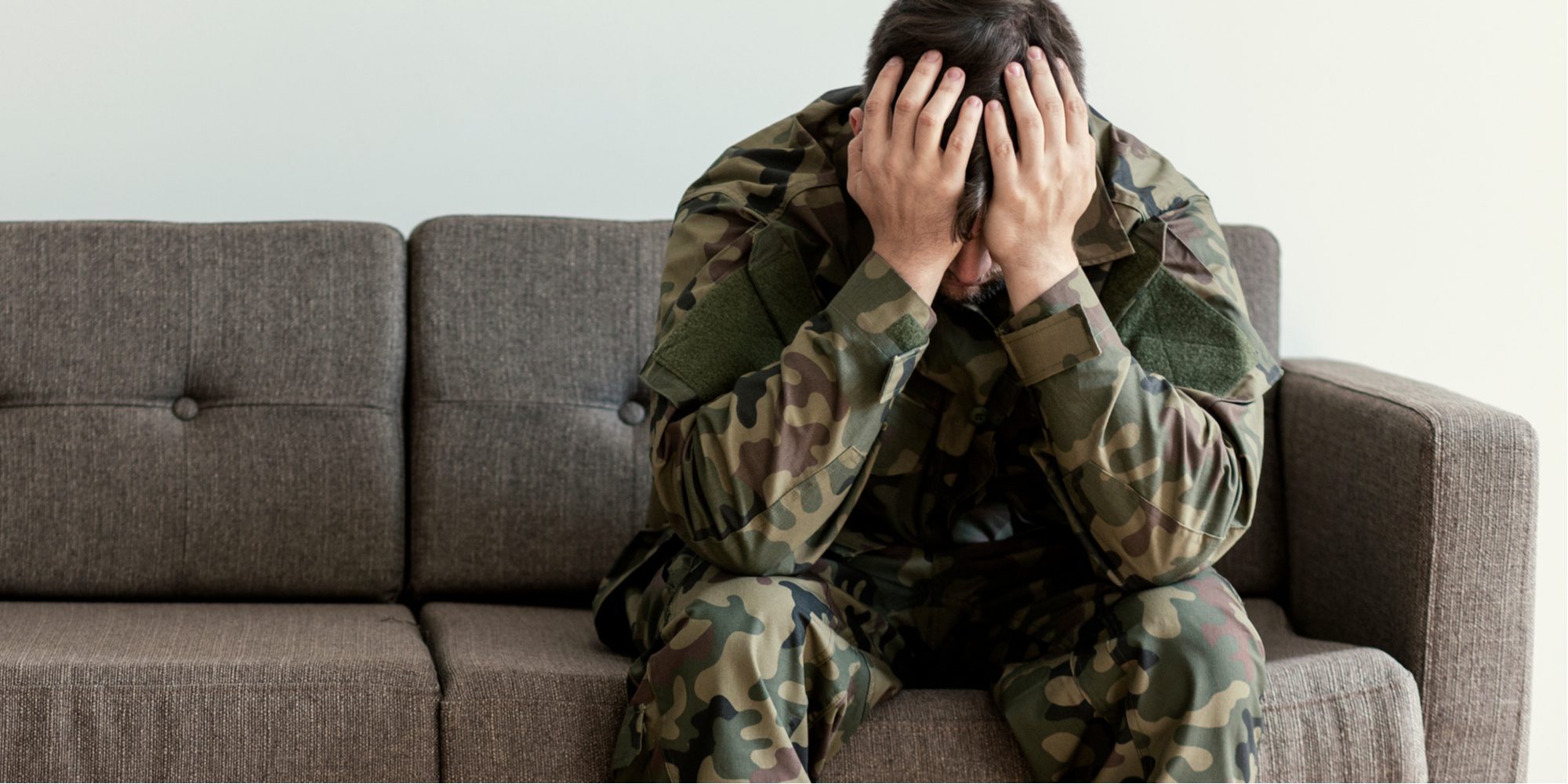Many United States military personnel experience post-traumatic stress disorder (PTSD) symptoms at some point in their lives. But leaving PTSD untreated can lead to a lot of complications, including angry outbursts, substance use disorders, and further mental health concerns.
If you are concerned that you or a loved one has PTSD, this article is here to help you understand everything you need to know about the signs and symptoms of PTSD in order for you to seek the treatment you might need.
What Is PTSD?

Before jumping into the signs of PTSD, let’s break down exactly what this disorder is and how it affects many veterans throughout the country.
According to the National Center for PTSD, post-traumatic stress disorder is a mental health condition that can occur after somebody has experienced a traumatic event. Going through a traumatic experience can actually affect areas of the brain, especially depending on when the trauma happened during development.
Ready to start your journey to recovery?
When you have PTSD, your brain is constantly working to find ways to protect itself from reminders of the trauma because certain aspects of the traumatic event are just too painful to cope with. Put simply, memories of the traumatic experience are too difficult to deal with, so your brain never processes them and moves on. This leads to memory loss, triggers, nightmares, and persistent emotional discomfort.
While anybody who has gone through a traumatic experience or significant distress has a chance of developing PTSD, veterans are commonly associated with having this disorder simply because of their exposure to combat, natural disasters, illness, injury, death, and other life-threatening, traumatic events.
This condition typically causes emotional, physical, and behavioral symptoms that can greatly impact one’s daily life. Unfortunately, PTSD symptoms aren’t always crystal clear and many people, including veterans, don’t ever receive a diagnosis.
In fact, people with PTSD sometimes have so many feelings of guilt or shame surrounding their symptoms that they don’t even feel comfortable telling a close friend or family member what they’re going through. Of course, keeping all of these feelings bottled up inside won’t make the symptoms go away. Therefore, many people with PTSD also struggle with substance abuse. Turning to alcohol or drugs might feel like the only solution to escape the emotional, physical, and mental pain.
This is why it’s so important to understand the signs of PTSD. If you or a loved one is familiar with any of the signs below, it could be easier to recognize that there is a problem and then seek treatment. With that said, let’s explain some of the common symptoms of PTSD.
PTSD Symptoms and Warning Signs
Symptoms of PTSD, as stated above, can present themselves through somebody’s mental, physical, and behavioral health. These symptoms can range in severity, which is why they can be hard to detect for some veterans. Additionally, symptoms don’t always show up right after you’ve gone through a traumatic event—and they aren’t always consistent.
Be sure to speak to a mental health professional who understands veterans if you or a loved one experiences any of the following signs of PTSD.
Mental Health Signs of PTSD
The emotional distress that somebody with PTSD feels is usually the first sign of this disorder. Common signs of PTSD that involve your mental health include:
- Flashbacks and nightmares—Reliving the traumatic experience is extremely common for people with PTSD. Having a flashback to the traumatic event tricks your body into thinking that it is back in the unsafe environment. This can cause a flight-or-fight response in which your mind and body automatically react as a means of survival.
- Triggers—Similar to flashbacks, triggers can be objects, sounds, or situations (such as being stuck in a crowded place) that take your mind and body back to the moment of trauma. In these instances, you feel that you are in danger, even if there is no true threat.
- Avoidance—This is one of the biggest PTSD symptoms. Avoiding certain situations, environments, and situations is another way to try to forget or push against reminders of the traumatic experience.
- Angry outbursts—Not being able to control your emotional responses is a common sign of PTSD. Angry outbursts, crying, and persistently feeling “on edge” are all PTSD symptoms.
- Persistent anxiety—Feeling like something isn’t right or experiencing constant worries are other mental health symptoms that come with PTSD. You might have nagging, negative thoughts that are hard to get out of your mind in specific situations related to triggers or potential danger or even experience an anxiety attack.
- Feelings of guilt—Though having symptoms of PTSD is not your fault and not something you can control (though it is something that can be treated), many veterans feel intense guilt or shame. These feelings of guilt are often related to the traumatic events. You might feel that you should have been able to stop the trauma or help somebody in need. The truth is that people often have little to no control in situations of trauma. Seeking treatment can often help people with PTSD better understand the situation and cope with these uncomfortable feelings.
Physical Signs of PTSD
One of the biggest misconceptions about PTSD is that it only causes emotional distress. While emotional symptoms are certainly part of the disorder, your body could also be expressing signs of PTSD through physiological or physical symptoms.
The mental health signs of PTSD listed above often go hand-in-hand with the physical symptoms, which include:
- Headaches
- Nausea and vomiting
- Sweating
- Rapid heartbeat
- Changes in sleeping patterns
- Chest pains
- Dizziness
The physical symptoms of PTSD can greatly impact your ability to work, socialize, exercise, etc. But it’s important to seek treatment for the mental health aspect of PTSD in addition to these physical sensations—without the right therapies and coping strategies to better your mental health, your physical symptoms might continue to get worse.
Behavioral Health Symptoms
Some of the lesser known signs of PTSD have to do with your behavioral health. Behavioral responses to PTSD can vary from self-isolating completely to partying with strangers every night. The constant emotional and physical discomfort of PTSD can lead to behaviors that are out of the ordinary because you are trying to escape the pain of the symptoms.
People with PTSD symptoms can act out recklessly, engaging in behaviors that could harm themselves or others. This is especially true for people who struggle with substance abuse issues. Using alcohol or drugs might mask or numb the pain for people with PTSD for a short period of time, but it doesn’t actually address the problem.
If you feel as though you haven’t been acting like yourself after a traumatic event, you might be struggling with PTSD. This can feel confusing and frustrating, but know that, with the right treatment, you can work toward a healthier, happier version of yourself.
Treatment for PTSD Symptoms

There are many different treatments for PTSD that could help to ease your symptoms and even address co-occurring disorders like substance abuse. For veterans, it’s important to find a treatment center that will work with your specific needs so that you can get the most out of your care.
Treatment for PTSD often comes in the form of different traditional therapies, such as:
- Individual counseling
- Group therapy/support groups
- Eye movement desensitization and reprocessing therapy (EMDR)
- Cognitive behavioral therapy (CBT)
- Family therapy.
But there are other ways of treating PTSD symptoms, too. Medication management, art therapy, staying connected with a network of veterans, job preparedness training, and assessing your physical health through exercise and nutrition plans are also all elements that go into healing from this disorder.
In cases where people with PTSD also experience substance abuse struggles, there are specific therapies that work to treat both. In these addiction recovery programs, veterans should:
- Be introduced to the 12-step program
- Have access to safe alcohol and drug detox
- And develop the skills they need to maintain sobriety after their time in the program.
With all of these different therapeutic approaches, it’s more possible than ever for veterans to recover from PTSD, substance use disorder, and other mental health concerns.
Find Treatment Today
At Heroes’ Mile, we understand how confusing PTSD symptoms can be, and we know that reaching out for assistance is often the hardest step. That’s why we make asking for help as easy as possible.
If you would like more information on the signs of PTSD, substance abuse, and how you can find treatment that is made by veterans for veterans, we’re here to help. Give us a call at 888-838-6692 or submit a confidential contact form online.

